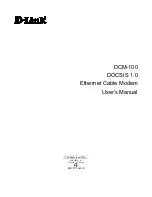
♦
AC Power Connector -
For the included power adapter, if you use a power adapter other than the one
included with the product, please make sure it has a DC output of 12V/1A.
♦
Ethernet 10BASE-T Port -
The 10BASE-T Ethernet port accepts Category 5 or better UTP cabling with
an RJ-45 connector used to connect the DCM-100 to a LAN device (hub, switch, PC, etc.).
♦
Cable In -
This jack is used to connect the DCM-100 to the splitter. This connection uses a standard coax
cable which is the same cable used by your cable TV company.
Connection Architecture
In order for you to enjoy the benefits of your Cable Modem, your PC and TV must be properly connected to the
cable TV wire. The following diagram illustrates a typical PC/TV installation.
♦
Cable TV Wall Outlet
- This is the normal cable TV wall outlet installed by your cable company. If you
plan to connect both your TV and your computer to the cable TV wire, the cable TV wall outlet should be
connected to a splitter.
♦
Splitter -
This unit, usually provided by your cable TV company during installation, splits the signal onto
a second wire. The two wires coming out of the splitter can be connected to your TV (or set-top box), and
the cable modem.
NOTE:
1.
If your cable TV company does not provide a splitter or you chose to buy your own, make sure
you get one with sufficient frequency range (the range should be printed on the splitter). A
range of 5 to 1000 MHz should be adequate. The splitter should provide EMI isolation.
2.
Only one splitter should be placed between the point where the cable TV line enters the house
and the Cable Modem/PC (see figure above). If you have multiple TVs, split the line between
the first splitter and the TV, not the line between the splitter and the Cable Modem.
3.
WARNING:
Do not use amplifiers in the line leading to your Cable Modem. Not only do most
amplifiers only amplify incoming signals, while your Cable Modem receives and sends signals,
but they are also likely to distort cable modem signals.
5



































